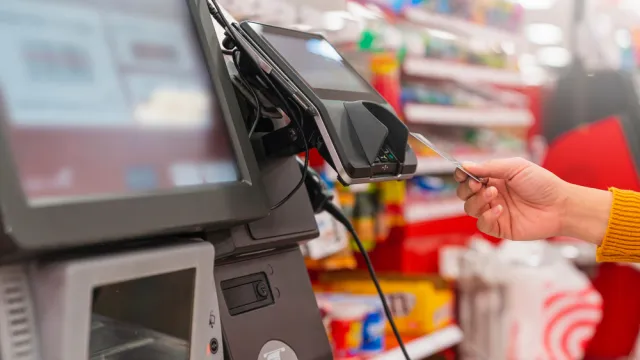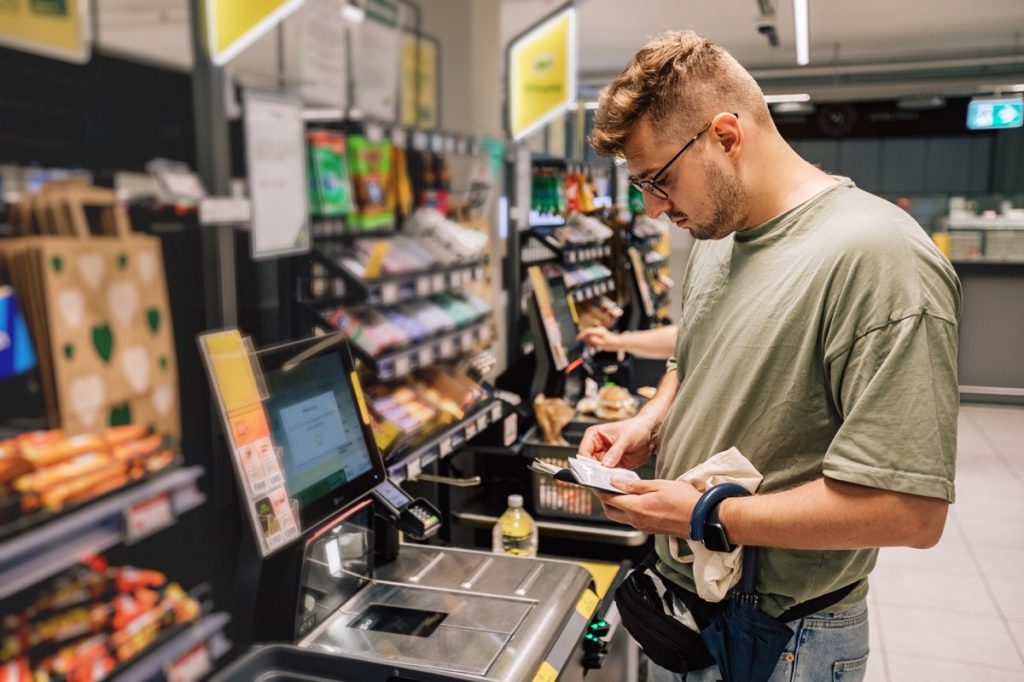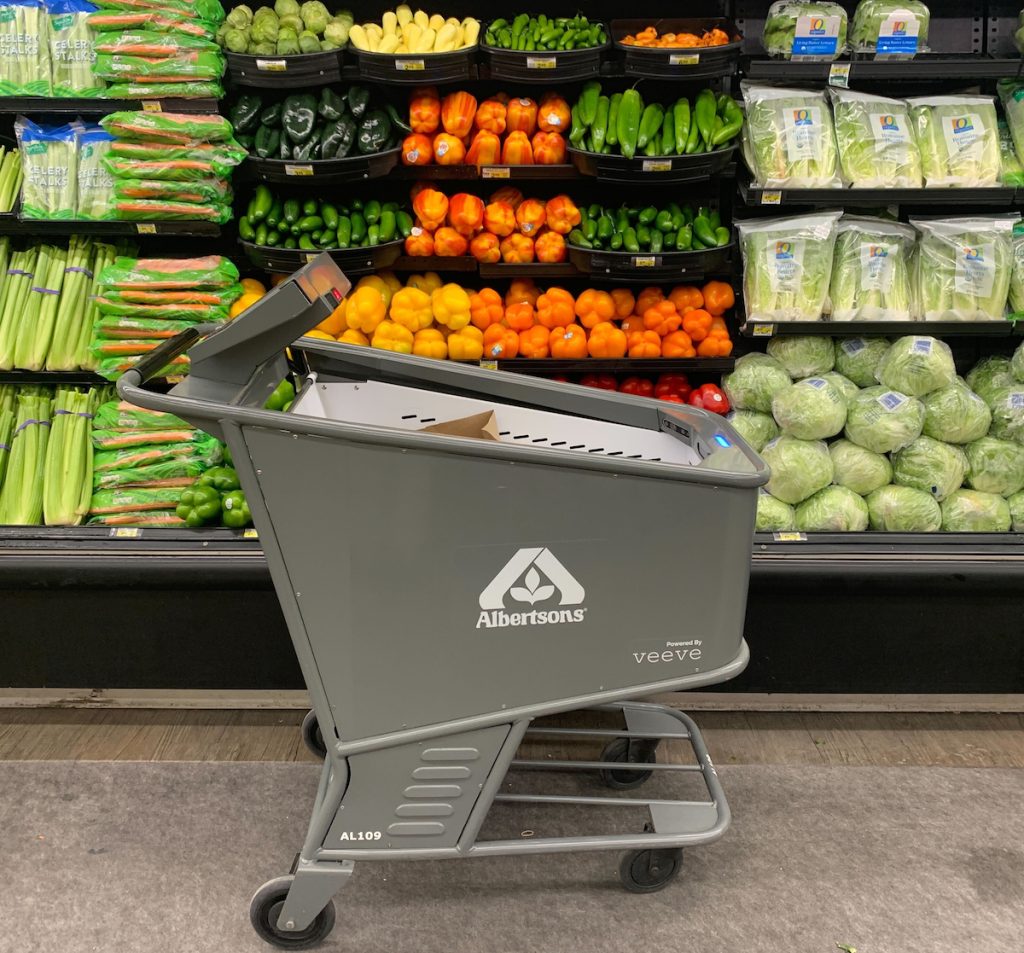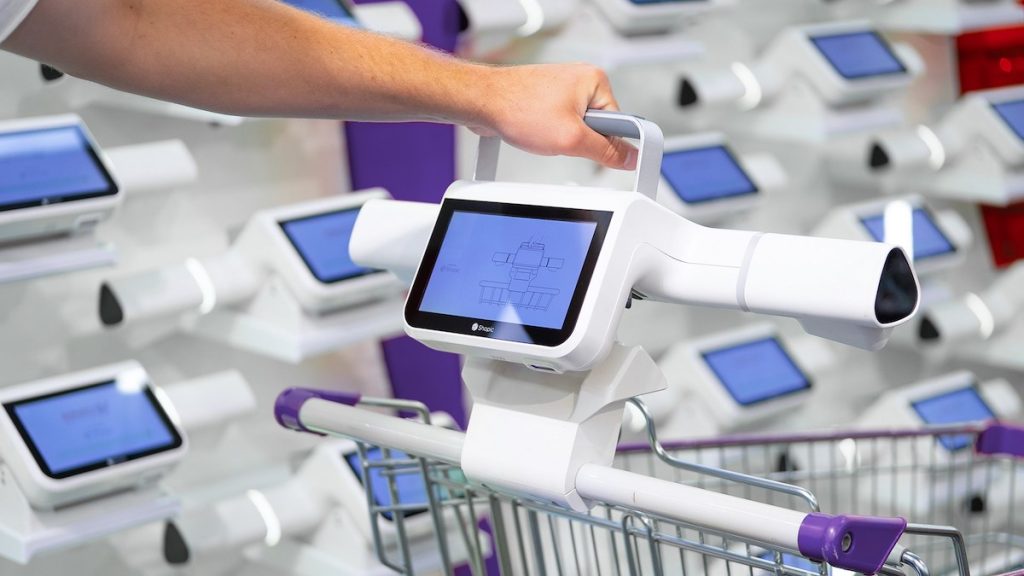Industry Expert Predicts “Demise of Self-Checkouts” and What’s Coming Next

Of all the changes the retail experience has undergone in recent years, the spread of self-checkout kiosks stands out as arguably one of the most notable. But while the technology was brought on to make getting out of the store more efficient, customers have largely pushed back on the machines as being confusing to use, impersonal, and potentially even risky for anyone who forgets to scan an item. Now, as some companies are beginning to show signs of cooling on the newly implemented cash registers, industry experts predict the “demise of self-checkouts” may be on the horizon. Read on to see what could be coming next in this chapter of retail history.
RELATED: Walmart Worker Issues Warning to Shoppers About Self-Checkout.
An industry expert says signs point to the “demise of self-checkout” coming soon.

Self-checkout kiosks were ushered into service on a wave of hope. Customers looked forward to cutting down on waiting in line, while retailers could refocus labor toward other endeavors in a win-win for both parties. But in the years since they’ve become commonplace, the relationship between shoppers and the machines has become strained, to say the least.
From dreaded “wrong item weight” errors springing up to confusion while trying to select the right produce, many customers have become fed up with the now complicated process—especially when they’re asked to leave a tip. Retailers have also faced increased “shrink,” with one study finding stores that have self-checkout typically have a theft or loss rate that’s more than double the industry average, CNN reports.
Some companies are already taking action. U.K.-based supermarket Booths made headlines when it announced it would be doing away with its self-checkout machines due to customer complaints, CNN reports. And in the U.S., Wegmans discontinued an app that allowed customers to scan and pay for items with their phone when it noticed a spike in theft.
With angst on both sides of the equation, experts including food industry analyst Phil Lempert think this means a significant change is likely coming.
“I think we are going to see the demise of self-checkouts very soon,” he told local Milwaukee, Wisconsin, CBS affiliate WDJT in a recent interview.
RELATED: Shoppers Are Abandoning Costco, New Data Reveals—Here’s Why.
Recent accusations of shoplifting have pushed the situation beyond inconvenience.

But while a confusing interface can sometimes lead to longer checkout times for some shoppers, it’s also proven to have much more serious consequences for others. Lempert points out that the lack of human interaction while paying has led to incidents requiring more security guards and staff watching the process. In the worst-case scenarios, some innocent customers were even accused of shoplifting.
“They were brought back to the security room and threatened they were going to be arrested for not scanning a tube of toothpaste,” he told WDJT.
Other lawsuits and proposed legislation have also taken aim at self-checkout, bringing more pressure on retailers. One lawmaker in Illinois proposed a high tax on each machine used by stores for removing a job while not reducing prices. And a Rhode Island lawmaker proposed legislation that would require stores to give customers using self-checkout a 10 percent discount for doing the work themselves.
Coupled with customer complaints of how inefficient the process is, Lempert says it’s not surprising that retailers would reconsider their stances on the technology. “It’s a horrible experience; you’re bound to make mistakes, it’s bound to go down,” he told WDJT.
RELATED: How Self-Checkout Is Making You Spend More, New Study Reveals.
Lempert believes products like “smart carts” are likely the future.

While paying up a kiosk may be headed to the wayside, technology will still likely play a role in the shopping experience. Lempert suggests that other advances like “smart carts” may start to emerge as the industry norm.
Stores like Wegmans have already announced plans to roll out AI-powered carts developed by an Israeli company, Shopic, which can scan items placed into it with 99.4 percent accuracy, Forbes reports. Retailers like Kroger, Sobey’s, and Wakefern are also experimenting with grocery delivery company Instacart’s Caper AI tech in some of their stores. And Amazon has recently fine-tuned its Dash Carts after initially testing them in 2020 with plans to roll them out to Whole Foods stores, Supermarket News reports.
“Essentially, what we’re trying to do here at Shopic is to bridge the gap between e-commerce and in-person shopping experiences,” Shopic CEO and co-founder Raz Golan previously told Best Life. “Given the extent to which people have gotten used to the conveniences of e-commerce, there are certain aspects of that experience that are only possible in a digital-first environment.”
The new technology could make shopping trips faster by helping customers locate items immediately—not to mention saving the time spent waiting in line to scan and pay, Julie Ramhold, a consumer analyst with DealNews.com previously told Best Life. Smart carts could also help you stay on budget by tallying up what you’ve spent as you go.
RELATED: Walmart Rolling Out Controversial New Shopping Carts: “These Are Terrible.”
…But there could still be a few drawbacks to this technology, too.

But as with any technology, the shopping carts of the future might not be totally foolproof when they roll out. The ease of paying could make it more likely you’ll overspend as you continue to fill your cart, Ramhold previously told Best Life. And some shoppers may simply not want to take the time to go and put something back, even if it’s sent them over their budget.
Perhaps most importantly, the tech also doesn’t totally eliminate the issue of theft or “shrink.” Similar to the issue Wegmans previously faced with its app, some customers may choose not to scan some items. Still, the carts could find themselves in a better position than kiosks currently do.
“The good thing about smart shopping carts is that they use the tech to actually see when something has been added or removed from a cart, which is a great solution in theory,” Ramhold previously told Best Life. “But if the tech malfunctions or isn’t as precise for some reason, then it may make it easier for consumers to shoplift, which can hurt a store’s bottom line.”
RELATED: For more up-to-date information, sign up for our daily newsletter.